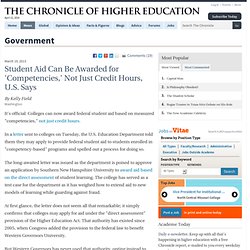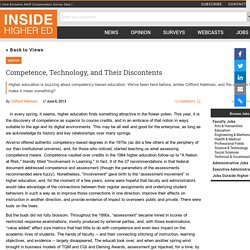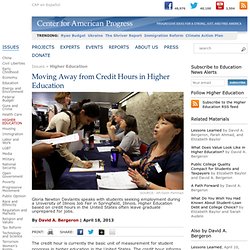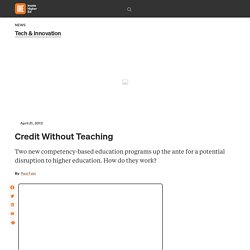

Student Aid Can Be Awarded for 'Competencies,' Not Just Credit Hours - Government. By Kelly Field Washington It's official: Colleges can now award federal student aid based on measured "competencies," not just credit hours.

In a letter sent to colleges on Tuesday, the U.S. Education Department told them they may apply to provide federal student aid to students enrolled in "competency-based" programs and spelled out a process for doing so. The long-awaited letter was issued as the department is poised to approve an application by Southern New Hampshire University to award aid based on the direct assessment of student learning. At first glance, the letter does not seem all that remarkable; it simply confirms that colleges may apply for aid under the "direct assessment" provision of the Higher Education Act.
But Western Governors has never used that authority, opting instead to keep converting its students' competencies into credits. When college leaders finally asked the Education Department about it, they said they received mixed messages from agency leaders. Higher ed discovers competency, again (essay) In every spring, it seems, higher education finds something attractive in the flower pollen.

This year, it is the discovery of competence as superior to course credits, and in an embrace of that notion in ways suitable to the age and its digital environments This may be all well and good for the enterprise, as long as we acknowledge its history and key relationships over many springs. Alverno offered authentic competency-based degrees in the 1970s (as did a few others at the periphery of our then institutional universe), and, for those who noticed, started teaching us what assessing competence means. Competence vaulted over credits in the 1984 higher education follow-up to "A Nation at Risk," blandly titled "Involvement in Learning. " In fact, 9 of the 27 recommendations in that federal document addressed competence and assessment (though the parameters of the assessments recommended were fuzzy). A ‘Disruptive’ Look at Competency-Based Education. SOURCE: AP/ Jacquelyn Martin Burck Smith, CEO of StraighterLine, which offers low-cost college courses online and then partners with colleges and universities to accept its learners and give them credit for coursework toward a degree.
By Louis Soares | June 7, 2012 Download this issue brief (pdf) Read this issue brief on your browser (Scribd) Mozilla’s Open Badges Initiative and MITx—the Massachusetts Institute of Technology’s cutting-edge initiative offering free, high-quality college courses online—have put a public spotlight on alternative ways to deliver postsecondary education that not only document whether a student has achieved a level of competence but also validate the learning that’s occurred. The question, of course, is whether these innovative learning initiatives and others like them can truly disrupt the current model of postsecondary education—a model that relies on time-based measures to structure and fund learning experiences.
Moving Away from Credit Hours in Higher Education. SOURCE: AP/Seth Perlman Gloria Newton Davlantis speaks with students seeking employment during a University of Illinois Job Fair in Springfield, Illinois.

Higher Education based on credit hours in the United States often leave graduate unprepared for jobs. By David A. Bergeron | April 18, 2013 The credit hour is currently the basic unit of measurement for student progress in higher education in the United States. Despite this fact, the term was formally undefined until 2010 when the U.S. There is growing dissatisfaction with credit hours, however, because they measure time instead of educational attainment and fail to provide any useful understanding of what students actually learned.
Consider this question: Why do so many graduates of highly regarded institutions need unpaid internships in order to demonstrate jobs skills before an employer will hire them? Another significant benefit of transitioning to competency-based models will likely be that graduates will incur less debt. Entering-a-program. Competency-based education's newest form creates promise and questions. Earlier this year Capella University and the new College for America began enrolling hundreds of students in academic programs without courses, teaching professors, grades, deadlines or credit hour requirements, but with a path to genuine college credit.

The two institutions are among a growing number that are giving competency-based education a try, including 25 or so nonprofit institutions. Notable examples include Western Governors University and the Kentucky Community and Technical College System. These programs are typically online, and allow students to progress at their own pace without formal course material. They can earn credit by successfully completing assessments that prove their mastery in predetermined competencies or tasks -- maybe writing in a business setting or using a spreadsheet to perform calculations. College for America and a small pilot program at Capella go a step further than the others, however, by severing any link to the credit hour standard. No 'Passing Fad'